How should we govern the church? Part 2: Pastors table of contents
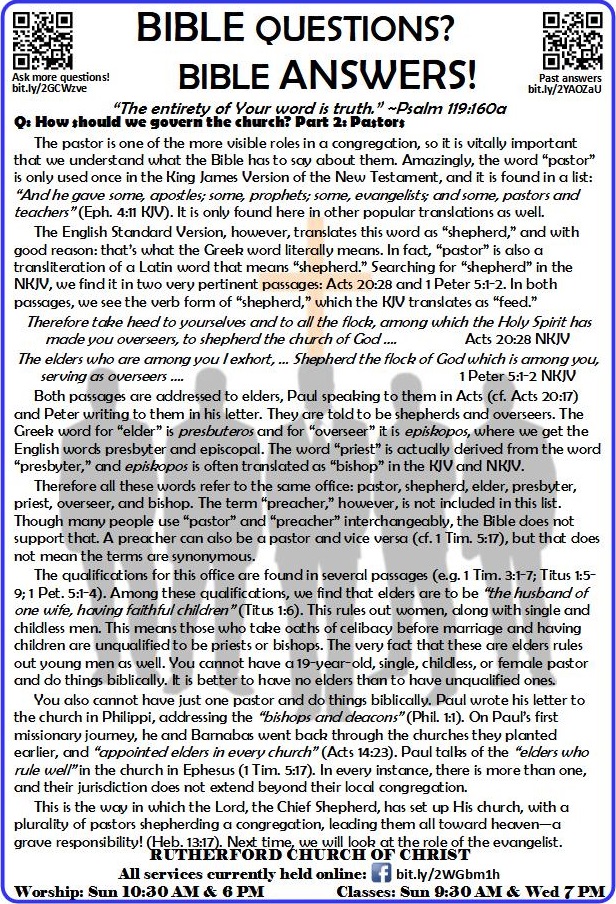 The pastor is one of the more visible roles in a congregation, so it is vitally important that we understand what the Bible has to say about them. Amazingly, the word “pastor” is only used once in the King James Version of the New Testament, and it is found in a list: “And he gave some, apostles; some, prophets; some, evangelists; and some, pastors and teachers” (Eph. 4:11 KJV). It is only found here in other popular translations as well (e.g. NKJV, NIV, NASB).
The pastor is one of the more visible roles in a congregation, so it is vitally important that we understand what the Bible has to say about them. Amazingly, the word “pastor” is only used once in the King James Version of the New Testament, and it is found in a list: “And he gave some, apostles; some, prophets; some, evangelists; and some, pastors and teachers” (Eph. 4:11 KJV). It is only found here in other popular translations as well (e.g. NKJV, NIV, NASB).
The English Standard Version, however, translates this word as “shepherd,” and with good reason: that’s what the Greek word literally means. In fact, “pastor” is also a transliteration of a Latin word that means “shepherd.” Searching for “shepherd” in the NKJV, we find it in two very pertinent passages: Acts 20:28 and 1 Peter 5:1-2. In both passages, we see the verb form of “shepherd,” which the KJV translates as “feed.”
Therefore take heed to yourselves and to all the flock, among which the Holy Spirit has made you overseers, to shepherd the church of God ….
Acts 20:28 NKJV
The elders who are among you I exhort, … Shepherd the flock of God which is among you, serving as overseers ….
1 Peter 5:1-2 NKJV
Both passages are addressed to elders, Paul speaking to them in Acts (cf. Acts 20:17) and Peter writing to them in his letter. They are told to be shepherds and overseers. The Greek word for “elder” is presbuteros and for “overseer” it is episkopos, where we get the English words presbyter and episcopal. The word “priest” is actually derived from the word “presbyter,” and episkopos is often translated as “bishop” in the KJV and NKJV.
Therefore all these words refer to the same office: pastor, shepherd, elder, presbyter, priest, overseer, and bishop. The term “preacher,” however, is not included in this list. Though many people use “pastor” and “preacher” interchangeably, the Bible does not support that. A preacher can also be a pastor and vice versa (cf. 1 Tim. 5:17), but that does not mean the terms are synonymous.
The qualifications for this office are found in several passages (e.g. 1 Tim. 3:1-7; Titus 1:5-9; 1 Pet. 5:1-4). Among these qualifications, we find that elders are to be “the husband of one wife, having faithful children” (Titus 1:6). This rules out women, along with single and childless men. This means those who take oaths of celibacy before marriage and having children are unqualified to be priests or bishops. The very fact that these are elders rules out young men as well. You cannot have a 19-year-old, single, childless, or female pastor and do things biblically. It is better to have no elders than to have unqualified ones. [Additional: If a congregation lacks qualified men to act as elders, then they ought to work to train men to be qualified and appointed as soon as possible.]
You also cannot have just one pastor and do things biblically. Paul wrote his letter to the church in Philippi, addressing the “bishops and deacons” (Phil. 1:1). On Paul’s first missionary journey, he and Barnabas went back through the churches they planted earlier, and “appointed elders in every church” (Acts 14:23). Paul talks of the “elders who rule well” in the church in Ephesus (1 Tim. 5:17). In every instance, there is more than one, and their jurisdiction does not extend beyond their local congregation.
This is the way in which the Lord, the Chief Shepherd, has set up His church, with a plurality of pastors shepherding a congregation, leading them all toward heaven—a grave responsibility! (Heb. 13:17). Next time, we will look at the role of the evangelist.
How should we govern the church? Part 3: Evangelists table of contents
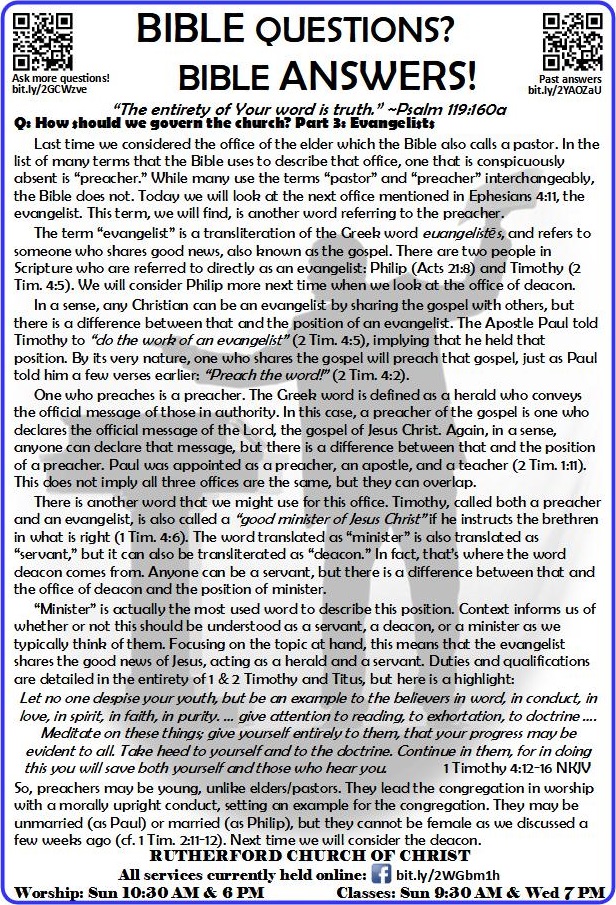 Last time we considered the office of the elder which the Bible also calls a pastor. In the list of many terms that the Bible uses to describe that office, one that is conspicuously absent is “preacher.” While many use the terms “pastor” and “preacher” interchangeably, the Bible does not. Today we will look at the next office mentioned in Ephesians 4:11, the evangelist. This term, we will find, is another word referring to the preacher.
Last time we considered the office of the elder which the Bible also calls a pastor. In the list of many terms that the Bible uses to describe that office, one that is conspicuously absent is “preacher.” While many use the terms “pastor” and “preacher” interchangeably, the Bible does not. Today we will look at the next office mentioned in Ephesians 4:11, the evangelist. This term, we will find, is another word referring to the preacher.
The term “evangelist” is a transliteration of the Greek word euangelistēs, and refers to someone who shares good news, also known as the gospel. There are two people in Scripture who are referred to directly as an evangelist: Philip (Acts 21:8) and Timothy (2 Tim. 4:5). We will consider Philip more next time when we look at the office of deacon.
In a sense, any Christian can be an evangelist by sharing the gospel with others, but there is a difference between that and the position of an evangelist. The Apostle Paul told Timothy to “do the work of an evangelist” (2 Tim. 4:5), implying that he held that position. By its very nature, one who shares the gospel will preach that gospel, just as Paul told him a few verses earlier: “Preach the word!” (2 Tim. 4:2).
One who preaches is a preacher. The Greek word is defined as a herald who conveys the official message of those in authority. In this case, a preacher of the gospel is one who declares the official message of the Lord, the gospel of Jesus Christ. Again, in a sense, anyone can declare that message, but there is a difference between that and the position of a preacher. Paul was appointed as a preacher, an apostle, and a teacher (2 Tim. 1:11). This does not imply all three offices are the same, but they can overlap.
There is another word that we might use for this office. Timothy, called both a preacher and an evangelist, is also called a “good minister of Jesus Christ” if he instructs the brethren in what is right (1 Tim. 4:6). The word translated as “minister” is also translated as “servant,” but it can also be transliterated as “deacon.” In fact, that’s where the word deacon comes from. Anyone can be a servant, but there is a difference between that and the office of deacon and the position of minister.
“Minister” is actually the most used word to describe this position. Context informs us of whether or not this should be understood as a servant, a deacon, or a minister as we typically think of them. Focusing on the topic at hand, this means that the evangelist shares the good news of Jesus, acting as a herald and a servant. Duties and qualifications are detailed in the entirety of 1 & 2 Timothy and Titus, but here is a highlight:
Let no one despise your youth, but be an example to the believers in word, in conduct, in love, in spirit, in faith, in purity. … give attention to reading, to exhortation, to doctrine …. Meditate on these things; give yourself entirely to them, that your progress may be evident to all. Take heed to yourself and to the doctrine. Continue in them, for in doing this you will save both yourself and those who hear you.
1 Timothy 4:12-16 NKJV
So, preachers may be young, unlike elders/pastors. They lead the congregation in worship with a morally upright conduct, setting an example for the congregation. They may be unmarried (as Paul) or married (as Philip), but they cannot be female as we discussed a few weeks ago (cf. 1 Tim. 2:11-12). Next time we will consider the deacon.
How should we govern the church? Part 4: Deacons table of contents
 To answer this question, we have been going through the offices mentioned in Ephesians 4:11, but today we will deviate from that somewhat by talking about the deacon. In our English Bibles, the word is only found in two or three passages depending on your translation. We will address those passages below.
To answer this question, we have been going through the offices mentioned in Ephesians 4:11, but today we will deviate from that somewhat by talking about the deacon. In our English Bibles, the word is only found in two or three passages depending on your translation. We will address those passages below.
The word “deacon” is a transliteration of the Greek word diakonos, something that we discussed last time when talking about the evangelist. This word is translated as “minister” or “servant”—the translation depends on the context. This word refers to many different kinds of people, including Paul, Timothy, Phoebe, even Jesus and the civil authorities—this does not make them all deacons of the church. Of course anyone can serve the church, but not everyone can hold the position of deacon.
The Apostle Paul addressed one of his letters “to all the saints in Christ Jesus who are in Philippi, with the bishops and deacons” (Phil. 1:1). The saints are all the Christians in Philippi, with an emphasis on the bishops (overseers, elders) and deacons. For our discussion on the elder, consider Part 2 of this series.
Paul’s first letter to Timothy lays out the qualifications for deacons (1 Tim. 3:8-13). Such people must be morally upright, and “the husbands of one wife, ruling their children and their own houses well” (1 Tim. 3:12). So, like the elder, the deacon is to be a man who is married with children.
Some contend that Phoebe was a female deacon (Rom. 16:1-2). While she is described as a diakonos, most translations call her a servant because of the requirement mentioned above. Yet there is a curious verse in the qualifications for a deacon: “Likewise, their wives must be reverent …” (1 Tim. 3:11 NKJV). Since the Greek word for “wife” can also be translated “woman” and “their” is not in the Greek, some translations say, “Women must likewise be …” (NASB). But the following verse (1 Tim. 3:12) tells us that this cannot be referring to female deacons.
Deacons also are to be tested and shown capable of handling the tasks given to them (1 Tim. 3:10). How can they be tested unless they are first given the opportunity to serve? Since the tasks and the method of testing are not specified in Scripture, it is left to the judgment of the elders of the congregation to determine the needs of the congregation and how a prospective deacon should be tested.
In Acts 6:1-7, the Apostles appointed seven men, commonly understood to be deacons, to serve the congregation in Jerusalem by giving them a specific task. After persecutions arose in the church, many of the Christians in Jerusalem scattered, and one of them named Philip went to preach the gospel to the Samaritans and an Ethiopian eunuch (Acts 8). Later we discover that he has four daughters and is called an evangelist living in Caesarea (Acts 21:8-9). Does this mean that the deacon and the evangelist are the same? Not necessarily, but they can overlap just as an evangelist can also be an elder (1 Tim. 5:17). While both serve, they have different qualifications and different duties.
So we find here the qualifications of deacons and the service they are to render to the Lord and to the church. While all Christians are called to serve in some capacity (Matt. 25:31-46), not everyone can be a deacon. Next time we will consider the teachers.
How should we govern the church? Part 5: Teachers table of contents
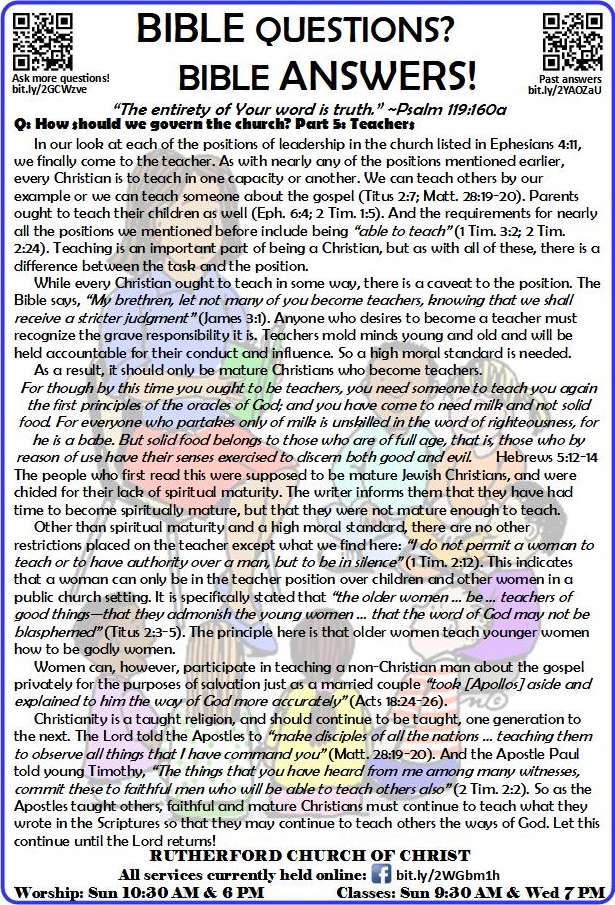 In our look at each of the positions of leadership in the church listed in Ephesians 4:11, we finally come to the teacher. As with nearly any of the positions mentioned earlier, every Christian is to teach in one capacity or another. We can teach others by our example or we can teach someone about the gospel (Titus 2:7; Matt. 28:19-20). Parents ought to teach their children as well (Eph. 6:4; 2 Tim. 1:5). And the requirements for nearly all the positions we mentioned before include being “able to teach” (1 Tim. 3:2; 2 Tim. 2:24). Teaching is an important part of being a Christian, but as with all of these, there is a difference between the task and the position.
In our look at each of the positions of leadership in the church listed in Ephesians 4:11, we finally come to the teacher. As with nearly any of the positions mentioned earlier, every Christian is to teach in one capacity or another. We can teach others by our example or we can teach someone about the gospel (Titus 2:7; Matt. 28:19-20). Parents ought to teach their children as well (Eph. 6:4; 2 Tim. 1:5). And the requirements for nearly all the positions we mentioned before include being “able to teach” (1 Tim. 3:2; 2 Tim. 2:24). Teaching is an important part of being a Christian, but as with all of these, there is a difference between the task and the position.
While every Christian ought to teach in some way, there is a caveat to the position. The Bible says, “My brethren, let not many of you become teachers, knowing that we shall receive a stricter judgment” (James 3:1). Anyone who desires to become a teacher must recognize the grave responsibility it is. Teachers mold minds young and old and will be held accountable for their conduct and influence. So a high moral standard is needed.
As a result, it should only be mature Christians who become teachers.
For though by this time you ought to be teachers, you need someone to teach you again the first principles of the oracles of God; and you have come to need milk and not solid food. For everyone who partakes only of milk is unskilled in the word of righteousness, for he is a babe. But solid food belongs to those who are of full age, that is, those who by reason of use have their senses exercised to discern both good and evil.
Hebrews 5:12-14 NKJV
The people who first read this were supposed to be mature Jewish Christians, and were chided for their lack of spiritual maturity. The writer informs them that they have had time to become spiritually mature, but that they were not mature enough to teach.
Other than spiritual maturity and a high moral standard, there are no other restrictions placed on the teacher except what we find here: “I do not permit a woman to teach or to have authority over a man, but to be in silence” (1 Tim. 2:12). This indicates that a woman can only be in the teacher position over children and other women in a public church setting. It is specifically stated that “the older women … be … teachers of good things—that they admonish the young women … that the word of God may not be blasphemed” (Titus 2:3-5). The principle here is that older women teach younger women how to be godly women.
Women can, however, participate in teaching a non-Christian man about the gospel privately for the purposes of salvation just as a married couple “took [Apollos] aside and explained to him the way of God more accurately” (Acts 18:24-26).
Christianity is a taught religion, and should continue to be taught, one generation to the next. The Lord told the Apostles to “make disciples of all the nations … teaching them to observe all things that I have command you” (Matt. 28:19-20). And the Apostle Paul told young Timothy, “The things that you have heard from me among many witnesses, commit these to faithful men who will be able to teach others also” (2 Tim. 2:2). So as the Apostles taught others, faithful and mature Christians must continue to teach what they wrote in the Scriptures so that they may continue to teach others the ways of God. Let this continue until the Lord returns!
How can we know that Jesus rose from the dead? table of contents
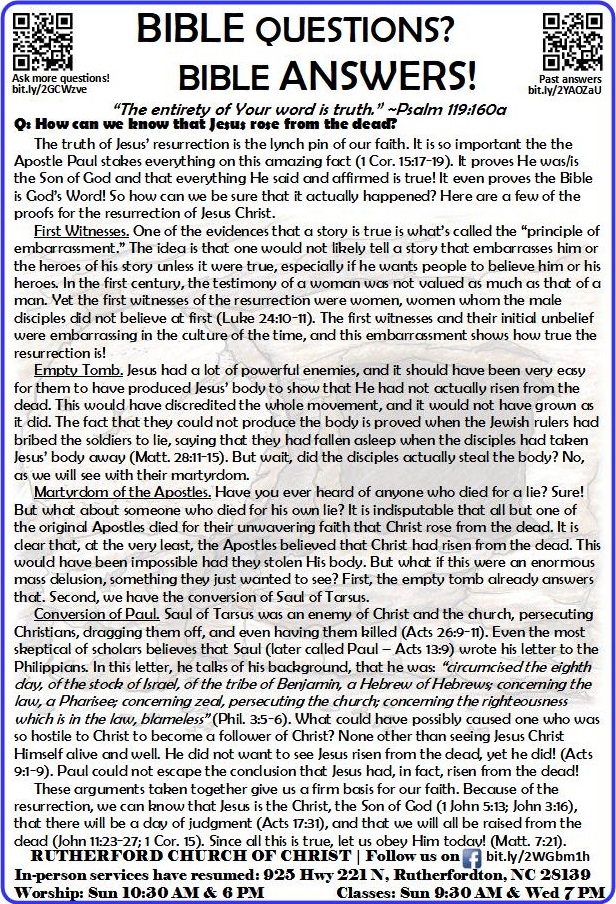 The truth of Jesus’ resurrection is the lynch pin of our faith. It is so important the the Apostle Paul stakes everything on this amazing fact (1 Cor. 15:17-19). It proves He was/is the Son of God and that everything He said and affirmed is true! It even proves the Bible is God’s Word! So how can we be sure that it actually happened? Here are a few of the proofs for the resurrection of Jesus Christ.
The truth of Jesus’ resurrection is the lynch pin of our faith. It is so important the the Apostle Paul stakes everything on this amazing fact (1 Cor. 15:17-19). It proves He was/is the Son of God and that everything He said and affirmed is true! It even proves the Bible is God’s Word! So how can we be sure that it actually happened? Here are a few of the proofs for the resurrection of Jesus Christ.
First Witnesses. One of the evidences that a story is true is what’s called the “principle of embarrassment.” The idea is that one would not likely tell a story that embarrasses him or the heroes of his story unless it were true, especially if he wants people to believe him or his heroes. In the first century, the testimony of a woman was not valued as much as that of a man. Yet the first witnesses of the resurrection were women, women whom the male disciples did not believe at first (Luke 24:10-11). The first witnesses and their initial unbelief were embarrassing in the culture of the time, and this embarrassment shows how true the resurrection is!
Empty Tomb. Jesus had a lot of powerful enemies, and it should have been very easy for them to have produced Jesus’ body to show that He had not actually risen from the dead. This would have discredited the whole movement, and it would not have grown as it did. The fact that they could not produce the body is proved when the Jewish rulers had bribed the soldiers to lie, saying that they had fallen asleep when the disciples had taken Jesus’ body away (Matt. 28:11-15). But wait, did the disciples actually steal the body? No, as we will see with their martyrdom.
Martyrdom of the Apostles. Have you ever heard of anyone who died for a lie? Sure! But what about someone who died for his own lie? It is indisputable that all but one of the original Apostles died for their unwavering faith that Christ rose from the dead. It is clear that, at the very least, the Apostles believed that Christ had risen from the dead. This would have been impossible had they stolen His body. But what if this were an enormous mass delusion, something they just wanted to see? First, the empty tomb already answers that. Second, we have the conversion of Saul of Tarsus.
Conversion of Paul. Saul of Tarsus was an enemy of Christ and the church, persecuting Christians, dragging them off, and even having them killed (Acts 26:9-11). Even the most skeptical of scholars believes that Saul (later called Paul – Acts 13:9) wrote his letter to the Philippians. In this letter, he talks of his background, that he was: “circumcised the eighth day, of the stock of Israel, of the tribe of Benjamin, a Hebrew of Hebrews; concerning the law, a Pharisee; concerning zeal, persecuting the church; concerning the righteousness which is in the law, blameless” (Phil. 3:5-6). What could have possibly caused one who was so hostile to Christ to become a follower of Christ? None other than seeing Jesus Christ Himself alive and well. He did not want to see Jesus risen from the dead, yet he did! (Acts 9:1-9). Paul could not escape the conclusion that Jesus had, in fact, risen from the dead!
These arguments taken together give us a firm basis for our faith. Because of the resurrection, we can know that Jesus is the Christ, the Son of God (1 John 5:13; John 3:16), that there will be a day of judgment (Acts 17:31), and that we will all be raised from the dead (John 11:23-27; 1 Cor. 15). Since all this is true, let us obey Him today! (Matt. 7:21).
Does being a Christian mean I have to be happy all the time? table of contents
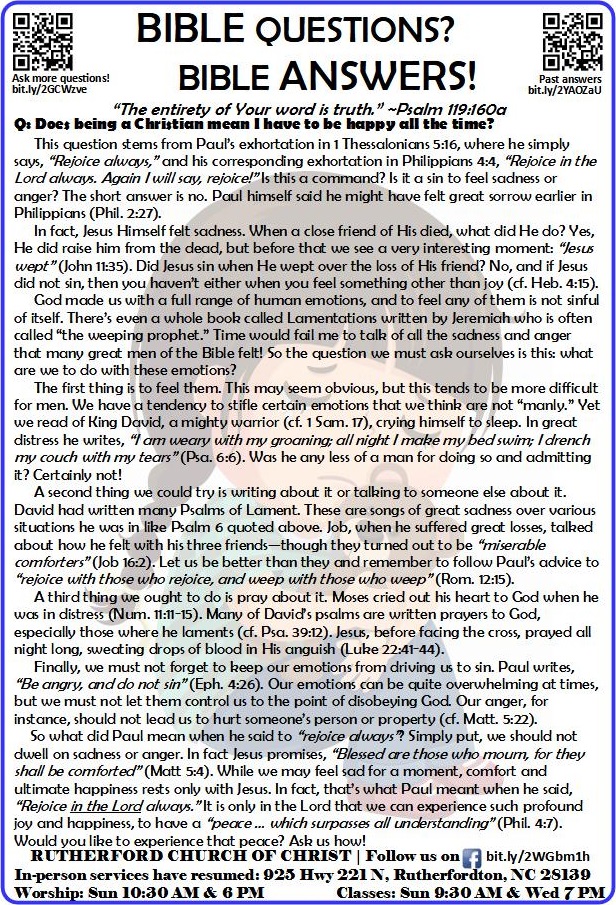 This question stems from Paul’s exhortation in 1 Thessalonians 5:16, where he simply says, “Rejoice always,” and his corresponding exhortation in Philippians 4:4, “Rejoice in the Lord always. Again I will say, rejoice!” Is this a command? Is it a sin to feel sadness or anger? The short answer is no. Paul himself said he might have felt great sorrow earlier in Philippians (Phil. 2:27).
This question stems from Paul’s exhortation in 1 Thessalonians 5:16, where he simply says, “Rejoice always,” and his corresponding exhortation in Philippians 4:4, “Rejoice in the Lord always. Again I will say, rejoice!” Is this a command? Is it a sin to feel sadness or anger? The short answer is no. Paul himself said he might have felt great sorrow earlier in Philippians (Phil. 2:27).
In fact, Jesus Himself felt sadness. When a close friend of His died, what did He do? Yes, He did raise him from the dead, but before that we see a very interesting moment: “Jesus wept” (John 11:35). Did Jesus sin when He wept over the loss of His friend? No, and if Jesus did not sin, then you haven’t either when you feel something other than joy (cf. Heb. 4:15).
God made us with a full range of human emotions, and to feel any of them is not sinful of itself. There’s even a whole book called Lamentations written by Jeremiah who is often called “the weeping prophet.” Time would fail me to talk of all the sadness and anger that many great men of the Bible felt! So the question we must ask ourselves is this: what are we to do with these emotions?
The first thing is to feel them. This may seem obvious, but this tends to be more difficult for men. We have a tendency to stifle certain emotions that we think are not “manly.” Yet we read of King David, a mighty warrior (cf. 1 Sam. 17), crying himself to sleep. In great distress he writes, “I am weary with my groaning; all night I make my bed swim; I drench my couch with my tears” (Psa. 6:6). Was he any less of a man for doing so and admitting it? Certainly not!
A second thing we could try is writing about it or talking to someone else about it. David had written many Psalms of Lament. These are songs of great sadness over various situations he was in like Psalm 6 quoted above. Job, when he suffered great losses, talked about how he felt with his three friends—though they turned out to be “miserable comforters” (Job 16:2). Let us be better than they and remember to follow Paul’s advice to “rejoice with those who rejoice, and weep with those who weep” (Rom. 12:15).
A third thing we ought to do is pray about it. Moses cried out his heart to God when he was in distress (Num. 11:11-15). Many of David’s psalms are written prayers to God, especially those where he laments (cf. Psa. 39:12). Jesus, before facing the cross, prayed all night long, sweating drops of blood in His anguish (Luke 22:41-44).
Finally, we must not forget to keep our emotions from driving us to sin. Both Paul and David write, “Be angry, and do not sin” (Eph. 4:26; Psa. 4:4). Our emotions can be quite overwhelming at times, but we must not let them control us to the point of disobeying God. Our anger, for instance, should not lead us to hurt someone’s person or property (cf. Matt. 5:22).
So what did Paul mean when he said to “rejoice always”? Simply put, we should not dwell on sadness or anger. In fact Jesus promises, “Blessed are those who mourn, for they shall be comforted” (Matt 5:4). While we may feel sad for a moment, comfort and ultimate happiness rests only with Jesus. In fact, that’s what Paul meant when he said, “Rejoice in the Lord always.” It is only in the Lord that we can experience such profound joy and happiness, to have a “peace … which surpasses all understanding” (Phil. 4:7). Would you like to experience that peace? Ask us how!
How should I deal with getting older? table of contents
 One of the great burdens of life is knowing that one day we will die: “For the living know that they will die” (Eccl. 9:5a). Many of us will get older and older before that happens, especially as medical science extends our lives and improves our quality of life. At the same time, the ravages of old age will affect all of us who do continue living—some more than others. This is a scary thought for some, while others take it in stride. But what does the Bible have to say about it?
One of the great burdens of life is knowing that one day we will die: “For the living know that they will die” (Eccl. 9:5a). Many of us will get older and older before that happens, especially as medical science extends our lives and improves our quality of life. At the same time, the ravages of old age will affect all of us who do continue living—some more than others. This is a scary thought for some, while others take it in stride. But what does the Bible have to say about it?
Before the Flood, Genesis records ages of people, many of which were in excess of 900 years! Some of them had children at ages older than many of us will ever see (Gen. 5). It would seem that God had originally designed for us to live for a long time, and perhaps for an eternity. We find in the Garden of Eden, that after the initial sin of Adam and Eve, God banished us from that garden so we would no longer have access to the Tree of Life (Gen. 3:24). After the Flood, which came as a result of sin and violence (Gen. 6:11-13), the ages of these men decreased substantially (Gen. 11:10-26). So it is fair to conclude that our bodies age and deteriorate as rapidly as they do as a result of living in a sinful world.
In other words, our bodies were never meant to deteriorate as they do. So God has something better waiting for us if we want it: a new body, incorruptible and glorious (1 Cor. 15:35ff).
It’s hard to think about such things when we are young and able. But King Solomon reminds us to: “Remember your Creator in the days of your youth, before the difficult days come, and the years draw near when you say, ‘I have no pleasure in them’ ” (Eccl. 12:1). When you’re young it’s easy to go through life without giving God a second thought, but Solomon here urges us to keep Him in mind before we lose our youth. While we’re young, we can do so much for God! If we do not take advantage of the opportunities He has given us while young, when we are old, we might regret it.
Even so, there are plenty of aged individuals in the Bible who have done great things. When Moses died, he was 120 years old, but “his eyes were not dim nor his natural vigor diminished” (Deut. 34:7). Caleb was still a great warrior at 85 (Josh. 14:10-11). Anna was an 84 year old widow, but she still “served God with fastings and prayers night and day” (Luke 2:37).
In all likelihood, however, when we age, our “natural vigor” will be diminished and we won’t be a great warrior. But that does not mean we have any less value. Anna still served God through fasting and prayer, something that is still much needed today! Isaac’s eyesight had failed, but his children could still benefit from his wisdom for many years (Gen. 27:1; 28:1-4). Paul was “aged,” but he was still writing letters urging brethren to do what’s right (Phm 9). The Lord may not be done with you yet! (Phil. 1:21-24).
Regardless, here is what the Lord thinks of the elderly: “The silver-haired head is a crown of glory, if it is found in the way of righteousness” (Prov. 16:31). Wear that crown knowing that the Lord considers such people glorious! But only if those silver hairs are found on one who is righteous. And such people will receive even further glory with an incorruptible body. But there’s only one way to receive it, through Jesus Christ, being obedient to His gospel (John 14:6; 2 Thess. 1:7-9). Contact us to learn more!
How do we navigate the media landscape to find truth? table of contents
 Ideally you would have a trusted source or several trusted sources to help you differentiate between truth and lies, but determining what is “fake news” in today’s world is beyond the scope of what we address here. False information, however, is prevalent in society today, particularly when considering religious matters. Some months ago, we had a series on various tips to help you interpret the Bible, which can help you navigate all the information you might be able to find in the darkest recesses of the internet. To view it, go to the link in the upper right corner.
Ideally you would have a trusted source or several trusted sources to help you differentiate between truth and lies, but determining what is “fake news” in today’s world is beyond the scope of what we address here. False information, however, is prevalent in society today, particularly when considering religious matters. Some months ago, we had a series on various tips to help you interpret the Bible, which can help you navigate all the information you might be able to find in the darkest recesses of the internet. To view it, go to the link in the upper right corner.
It is vitally important to be able to recognize truth, because of Paul’s admonition here:
I marvel that you are turning away so soon from Him who called you in the grace of Christ, to a different gospel, which is not another; but there are some who trouble you and want to pervert the gospel of Christ. But even if we, or an angel from heaven, preach any other gospel to you than what we have preached to you, let him be accursed. As we have said before, so now I say again, if anyone preaches any other gospel to you than what you have received, let him be accursed.
Galatians 1:6-9 NKJV
There is a danger of turning away from the gospel if what we have been taught has been perverted or altered in some way. But Paul goes back to what the Galatians knew was reliable: what they had heard from the very beginning. Of course, we are not privy to what that is except through the Scriptures themselves. So our objective source of truth comes from the Bible and the Bible alone, and everything must be measured next to it (cf. 2 Tim. 3:16-17).
Some like to think the Bible is an impossible book to understand, but when it says that “Jesus wept” (John 11:35), it doesn’t take a Ph.D. to understand that Jesus was weeping. Peter, however, does inform us that in the Scriptures there are “some things hard to understand, which untaught and unstable people twist to their own destruction” (2 Pet. 3:16). Take note that Peter did not say it was impossible to understand. He also warned of false teachers twisting the Scriptures to say something they don’t say. To guard yourself against this, Bible study and having a sound method for interpreting the Bible is incredibly important!
Ultimately, our source of authority is the Word of God, the Scriptures themselves. The Bible is inspired by God and is timeless, able to address by principle any issue that comes up. How? Because “there is nothing new under the sun” (Eccl. 1:9). Sin is still sin and righteousness is still righteousness no matter who is in office or whatever new technology is developed.
So how do we navigate the media landscape to find truth? We have to know the truth first. Jesus promises that “you shall know the truth, and the truth shall make you free” (John 8:32). What is the truth? Jesus tells us later that “[God’s] word is truth” (John 17:17). We can know the word by reading and studying it; then we will be able to recognize false teachings when we hear them. While honest and sound teachers will disagree in certain areas, they will not disagree on clear matters such as how to be saved, the nature of the church, and proper worship. In any event, never take our word for it, but “[search] the Scriptures daily to find out whether these things [are] so” (Acts 17:11).
How can I have a better relationship with my family? table of contents
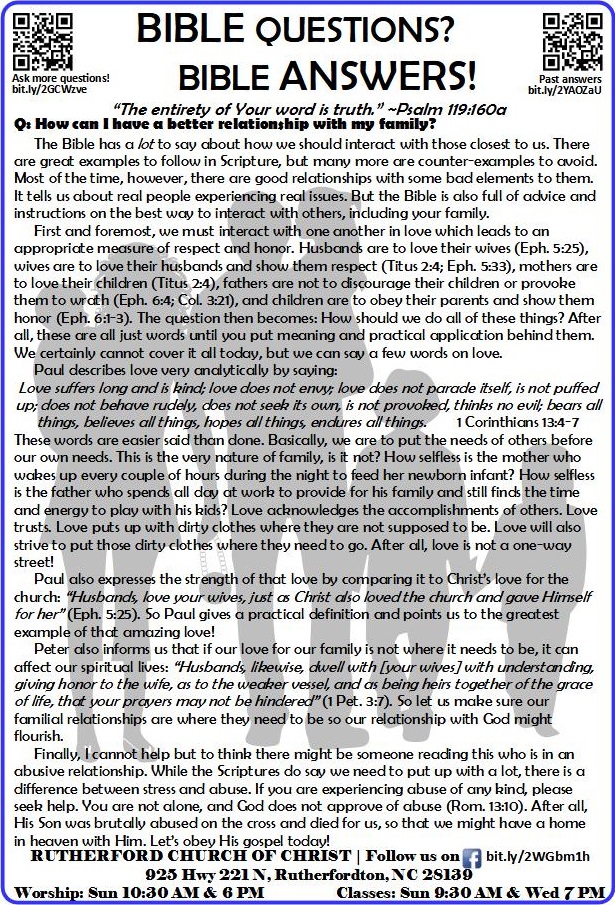 The Bible has a lot to say about how we should interact with those closest to us. There are great examples to follow in Scripture, but many more are counter-examples to avoid. Most of the time, however, there are good relationships with some bad elements to them. It tells us about real people experiencing real issues. But the Bible is also full of advice and instructions on the best way to interact with others, including your family.
The Bible has a lot to say about how we should interact with those closest to us. There are great examples to follow in Scripture, but many more are counter-examples to avoid. Most of the time, however, there are good relationships with some bad elements to them. It tells us about real people experiencing real issues. But the Bible is also full of advice and instructions on the best way to interact with others, including your family.
First and foremost, we must interact with one another in love which leads to an appropriate measure of respect and honor. Husbands are to love their wives (Eph. 5:25), wives are to love their husbands and show them respect (Titus 2:4; Eph. 5:33), mothers are to love their children (Titus 2:4), fathers are not to discourage their children or provoke them to wrath (Eph. 6:4; Col. 3:21), and children are to obey their parents and show them honor (Eph. 6:1-3). The question then becomes: How should we do all of these things? After all, these are all just words until you put meaning and practical application behind them. We certainly cannot cover it all today, but we can say a few words on love.
Paul describes love very analytically by saying:
Love suffers long and is kind; love does not envy; love does not parade itself, is not puffed up; does not behave rudely, does not seek its own, is not provoked, thinks no evil; bears all things, believes all things, hopes all things, endures all things.
1 Corinthians 13:4-7 NKJV
These words are easier said than done. Basically, we are to put the needs of others before our own needs. This is the very nature of family, is it not? How selfless is the mother who wakes up every couple of hours during the night to feed her newborn infant? How selfless is the father who spends all day at work to provide for his family and still finds the time and energy to play with his kids? Love acknowledges the accomplishments of others. Love trusts. Love puts up with dirty clothes where they are not supposed to be. Love will also strive to put those dirty clothes where they need to go. After all, love is not a one-way street!
Paul also expresses the strength of that love by comparing it to Christ’s love for the church: “Husbands, love your wives, just as Christ also loved the church and gave Himself for her” (Eph. 5:25). So Paul gives a practical definition and points us to the greatest example of that amazing love!
Peter also informs us that if our love for our family is not where it needs to be, it can affect our spiritual lives: “Husbands, likewise, dwell with [your wives] with understanding, giving honor to the wife, as to the weaker vessel, and as being heirs together of the grace of life, that your prayers may not be hindered” (1 Pet. 3:7). So let us make sure our familial relationships are where they need to be so our relationship with God might flourish.
Finally, I cannot help but to think there might be someone reading this who is in an abusive relationship. While the Scriptures do say we need to put up with a lot, there is a difference between stress and abuse. If you are experiencing abuse of any kind, please seek help. You are not alone, and God does not approve of abuse (Rom. 13:10). After all, His Son was brutally abused on the cross and died for us, so that we might have a home in heaven with Him. Let’s obey His gospel today!
Can’t I just say a prayer to be saved? table of contents
 To answer this question, let us first acknowledge that the goal we all must have is to read the Scriptures to find out what we must do to be saved. Since the resurrection and the Great Commission, no one was told to say a prayer to be saved. Some try to point to Simon the sorcerer (Acts 8:22), but he had already become a Christian before he was told to “repent … and pray God” (Acts 8:9-13). One may try to argue from the writings of Paul and John that you may say a prayer to be saved. Let’s consider some of those passages.
To answer this question, let us first acknowledge that the goal we all must have is to read the Scriptures to find out what we must do to be saved. Since the resurrection and the Great Commission, no one was told to say a prayer to be saved. Some try to point to Simon the sorcerer (Acts 8:22), but he had already become a Christian before he was told to “repent … and pray God” (Acts 8:9-13). One may try to argue from the writings of Paul and John that you may say a prayer to be saved. Let’s consider some of those passages.
One commonly cited passage is this: “If we confess our sins, He is faithful and just to forgive us our sins and to cleanse us from all unrighteousness” (1 John 1:9). One might say that to “confess your sins” simply means to pray to God, admitting that you’re a sinner. There’s one major problem with this: no letter in Scripture is addressed to those who are lost. Most letters begin by telling us who it is addressed to (e.g. Rom. 1:7; 1 Cor. 1:2). While 1 John does not have such an explicit salutation, there are clear indications throughout that John is writing to Christians. He writes to “my little children” (1 John 2:1; 3:18) or to those who are “beloved” (1 John 3:2, 21; 4:1, 7, 11). You see, this verse is talking about Christians who have sinned, not about sinners who want to become Christians.
Another commonly cited passage in support of the Sinner’s Prayer reads thus:
If you confess with your mouth the Lord Jesus and believe in your heart that God raised Him from the dead, you will be saved. For with the heart one believes unto righteousness, and with the mouth confession is made unto salvation … For “whoever calls on the name of the Lord shall be saved.”
Romans 10:9-10, 13 NKJV
Of course, faith and confessing Christ are absolutely needed for salvation (John 3:16; Matt. 10:32; Acts 8:37). But is that all we need to do? Jesus says that: “Not everyone who says to Me, ‘Lord, Lord,’ shall enter the kingdom of heaven, but he who does the will of my Father in heaven” (Matt. 7:21-23). The people Jesus is describing there clearly believed, but their obedience was lacking. Peter also stated, “whoever calls on the name of the Lord shall be saved” (Acts 2:21), just as Paul did. Later, when his hearers asked what they should do, he did not say, “admit that you’re a sinner and pray that Jesus comes into your heart.” No, instead he said, “Repent and be baptized every one of you in the name of Jesus Christ for the forgiveness of your sins” (Acts 2:38 ESV). So, combining these passages, we are to believe, repent, confess Christ, and be baptized for our sins to be forgiven.
Let’s consider a case study: Saul of Tarsus. On the road to Damascus, Saul encountered Christ who told him of the error of his ways. He then instructed Saul to go to Damascus and “you will be told what you must do” (Acts 9:6). While he was waiting there for the Christian Ananias to tell him what he must do, he was praying (Acts 9:11). If praying in faith could save, it would have saved Saul. Yet after Ananias spoke to him, he told Paul, “And now why are you waiting? Arise and be baptized, and wash away your sins, calling on the name of the Lord” (Acts 22:16). Clearly, his sins had not yet been washed away, but it could only be done when he called upon the name of the Lord in baptism (cf. Acts 9:18). This Saul would later become the Apostle Paul who wrote Romans cited above.
Now, what will you do to be saved? Say a prayer that is found nowhere in Scripture? Or obey the same gospel that Saul did? The choice is yours. Contact us to learn more!